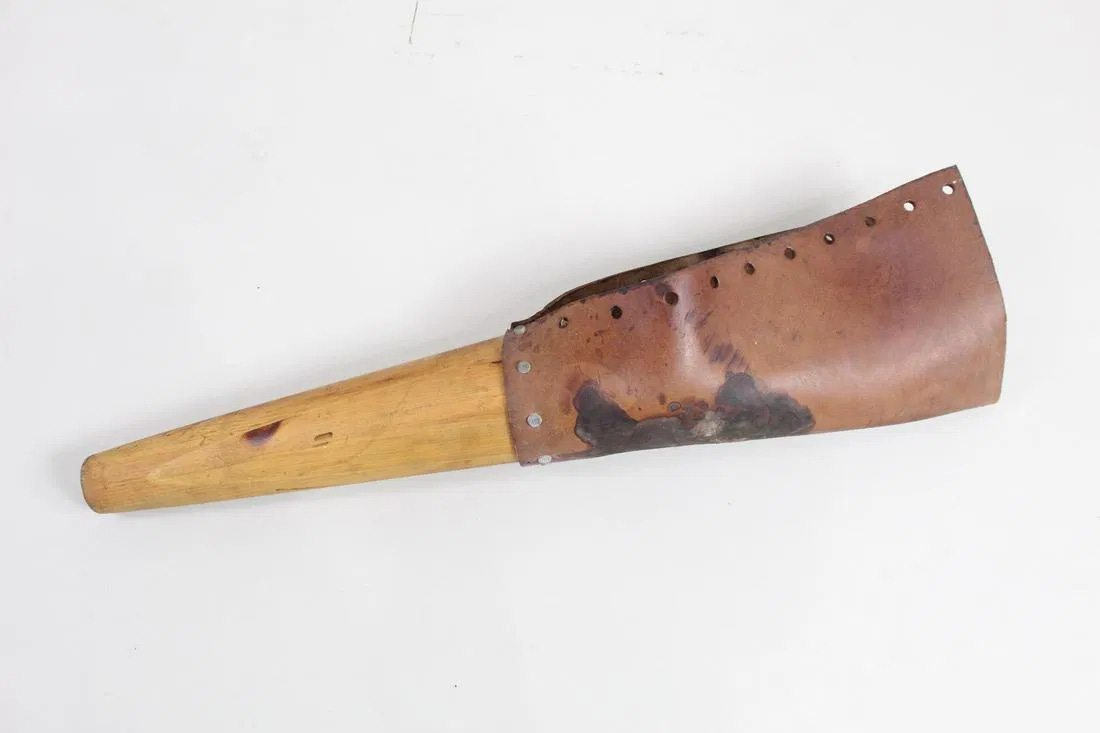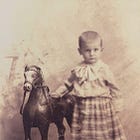A Boy Named Virgil, Part 2: A Shoe Repairman Called 'Crip'
Tales from a Small Village in Southern Illinois Circa 1900
A Boy Named Virgil is the first-person account of Virgil Bravard Browne, based on a letter he wrote to his niece, Marcia Moore Sagebiel, in 1958. The story is edited and read by me, his grandnephew. Read the introduction.
I recall that each winter we had a revival with some out-of-town evangelist and quite a few people would “get religion.” After the fervor of the meeting had worn off, they would go back to their old sinful way of life.
One in particular I remember was a man named Ralph “Crip” Grimes, who was one of the town drunkards.
Crip had lost a leg while drunk by falling under a freight train when he was trying to climb aboard. He wore a wooden peg that was secured by a strap around his waist. When he got into a drunken fight, he would take the peg leg off and use it as a club. He gave quite a good account of himself, leaning against some object or hopping around on his good leg and swinging the wooden leg.
Crip was the village shoe repairman and an excellent mechanic in his line. I wish it were possible to get the quality in material and workmanship now that we did then.
His work was done by hand. The heavy oak soles were stitched with Irish flax threads attached to bristles and heavily waxed. A half-sole cost 60 cents, a full sole $1.10, and heels 25 cents. On heavy “plow shoes,” the soles were attached with square wooden pegs driven into holes made with an awl. Moisture swelled the pegs, making them watertight and better than shoe nails. I doubt very much if a pegged shoe can be found in this country anymore.
Crip was a great lover of music. He had a tenor voice of great power and excellent tone. He possessed more than a novice’s knowledge of music, since he’d had some schooling in music.
His father played the violin and his mother the piano. I now know that they were a family who had seen better days, for the mother and father were quiet and refined in their speech and manner, and their dress was one of shabby gentility and of a cut seen only in cities. They had moved from St. Louis to our town, but for what reason I have no knowledge.
Crip, attracted by the soul-stirring hymns sung at the revivals, would take a seat near the rear of the church and sing with great vigor in his strong rich tenor that practically rattled the window panes, bringing glares to him in abundance for which he cared not at all. He was not appreciated, for there were few of that time who had a musical education.
When the meeting really got warmed up and the congregation was singing the good old standards such as “Just as I Am,” “O Why Not Tonight?” and others of like sentiment, Crip would stump his way to the altar, manage to kneel in spite of his peg leg, and pray manfully.
When the last persons had come forward to confess their sins and declared themselves saved, the congregation would break into the old standard of “Hallelujah ‘Tis Done! I believe on the Son; I am saved by the blood of the crucified one.”
Crip would rise and sit on the edge of the rostrum and sing with great fervor.
Two weeks after the revival had closed, Crip was once more back to the same life he had led before. He had the one weakness of drinking, and the fighting he invariably got mixed up in.
But he had many virtues to at least partly atone for his sins.
He loved animals and fed many stray dogs and cats. Once he knocked down a man who was beating a horse.
Crip made minor repairs on people’s shoes who had no money, though he could ill afford the cost of the material.
He respected and revered his parents, supporting them the best he could with his meager earnings.
It reminds one of the old adage, “There is so much good in the worst of us, and so much bad in the best of us, that it hardly behooves any of us to talk about the rest of us.”
Thank you for reading. If you liked this slice of FRIED BOLOGNA, please click the 🤍. Access the archives.







Mark Twain, Will Rogers, Virgil Brown, Neil Sagebiel
I love this prose. Virgil is a terrific writer with great powers of observation. I am enjoying his company.